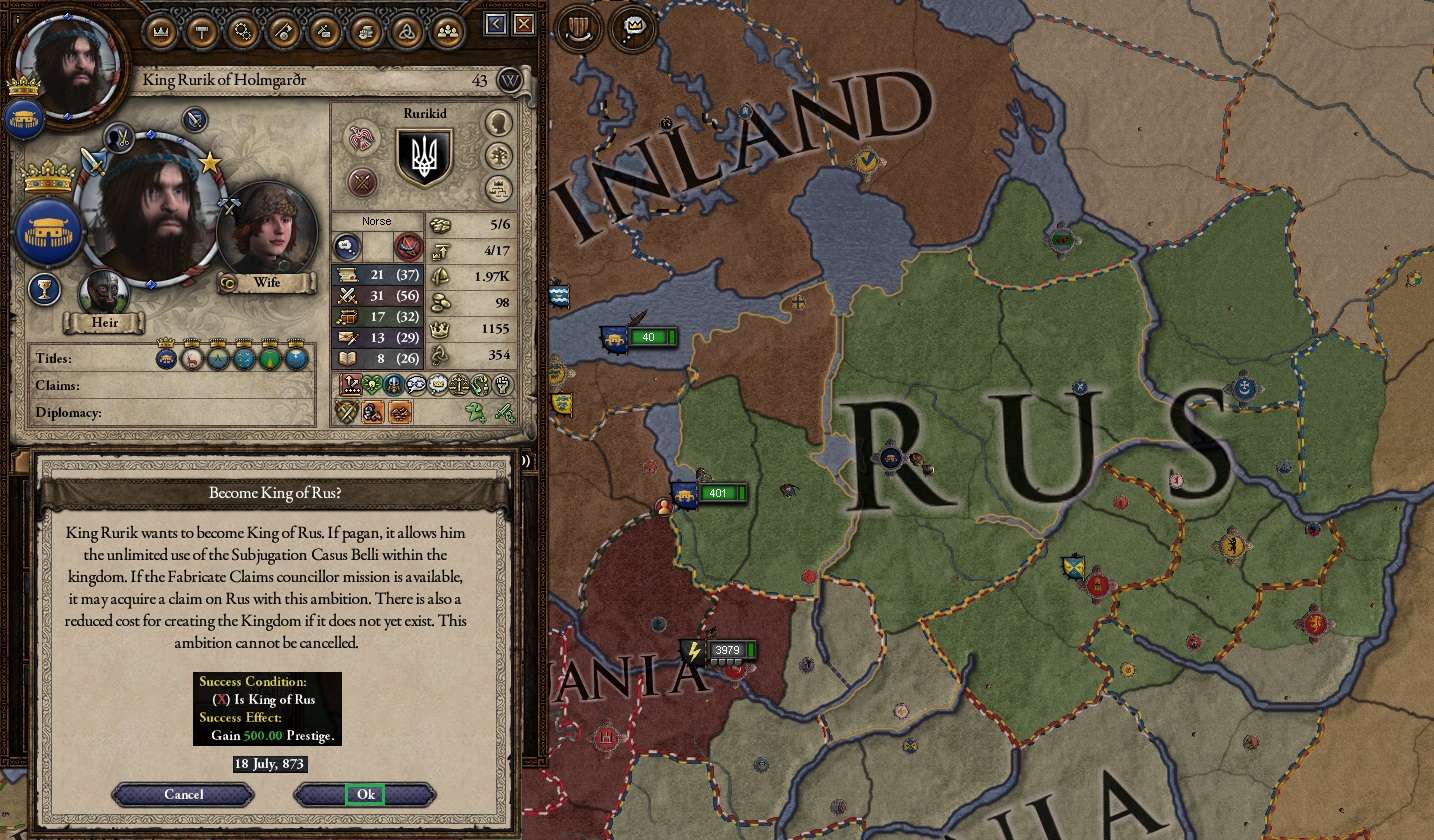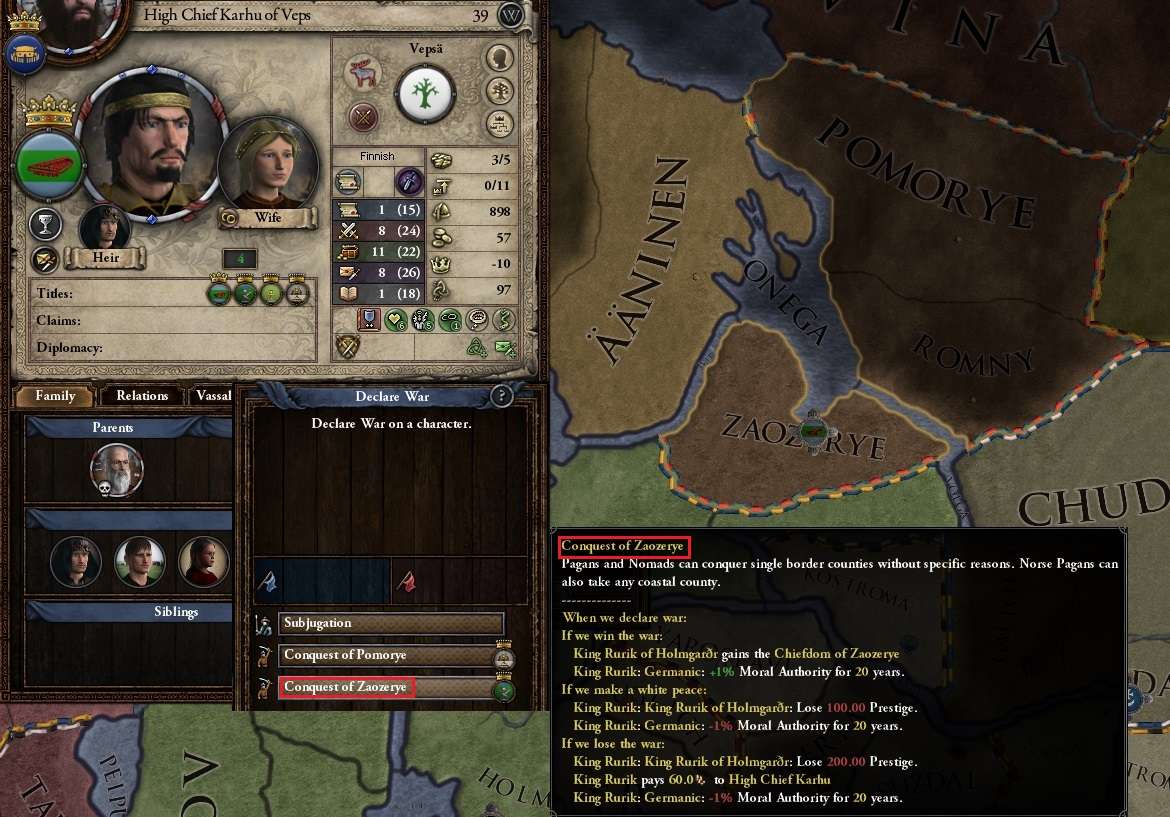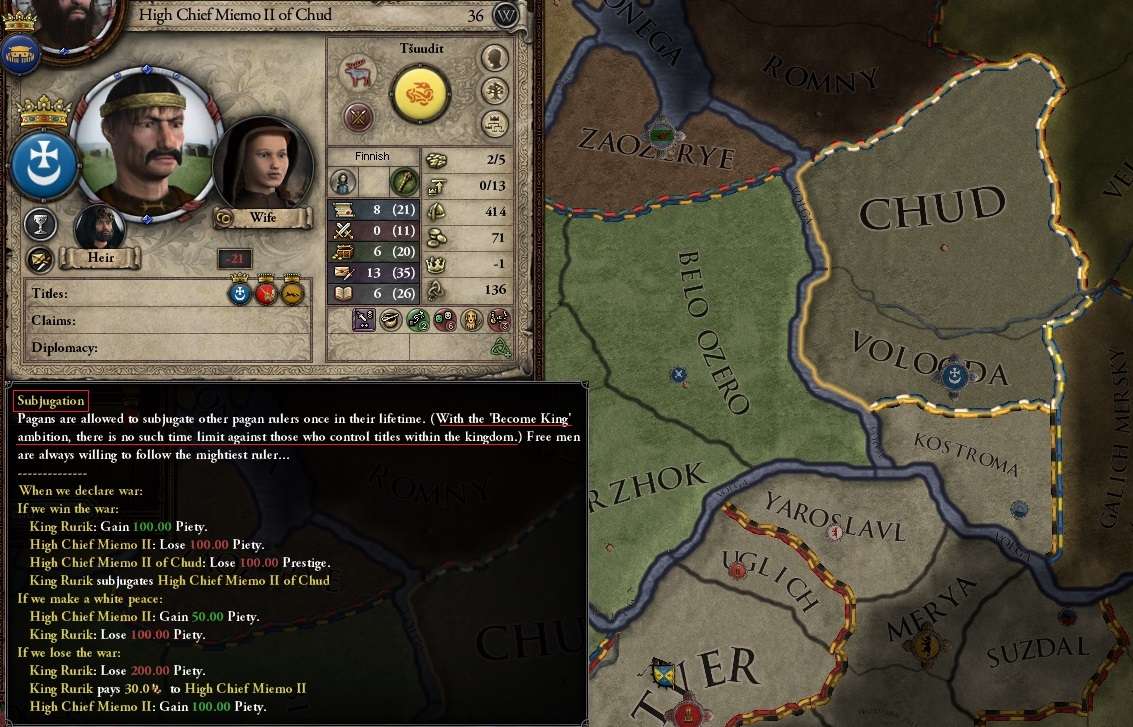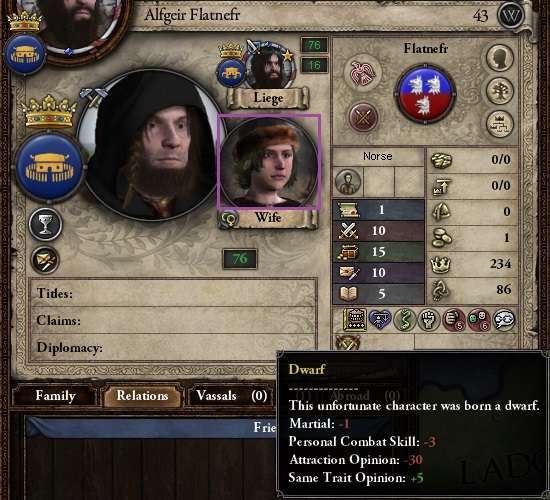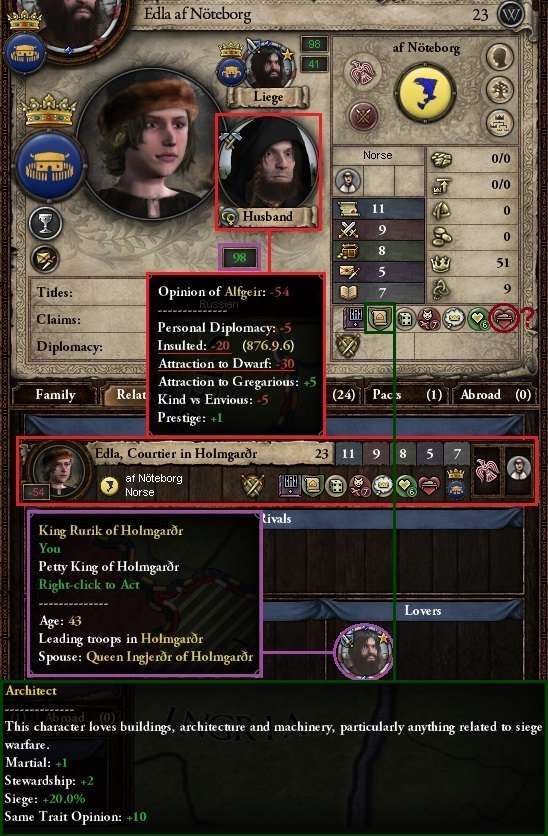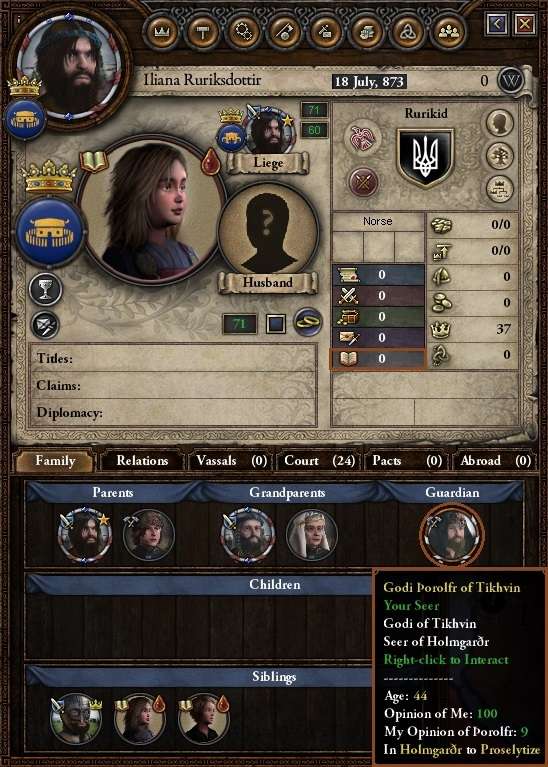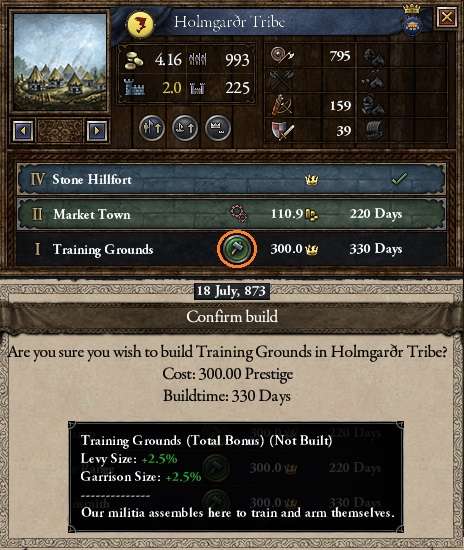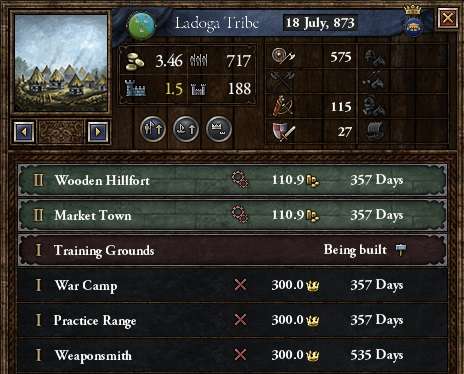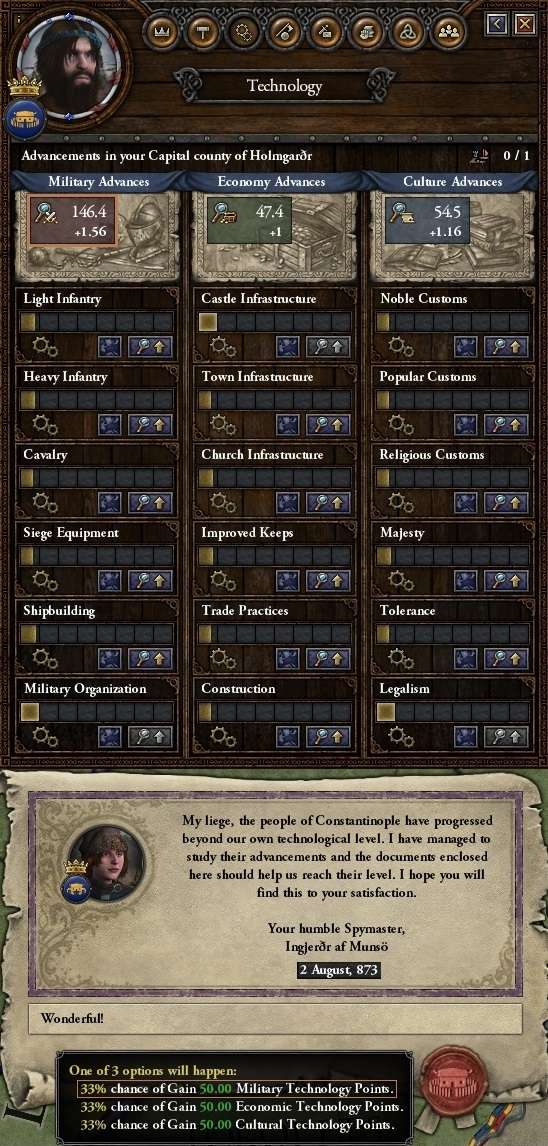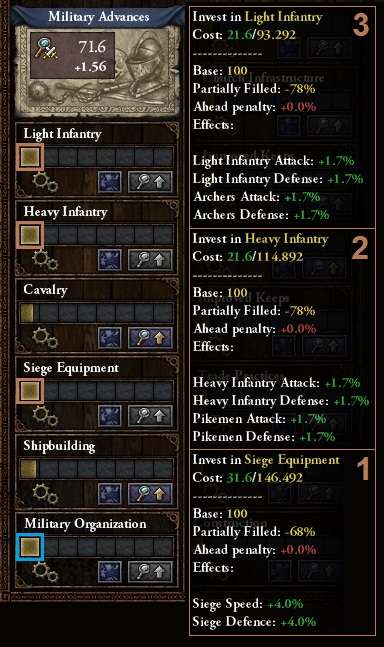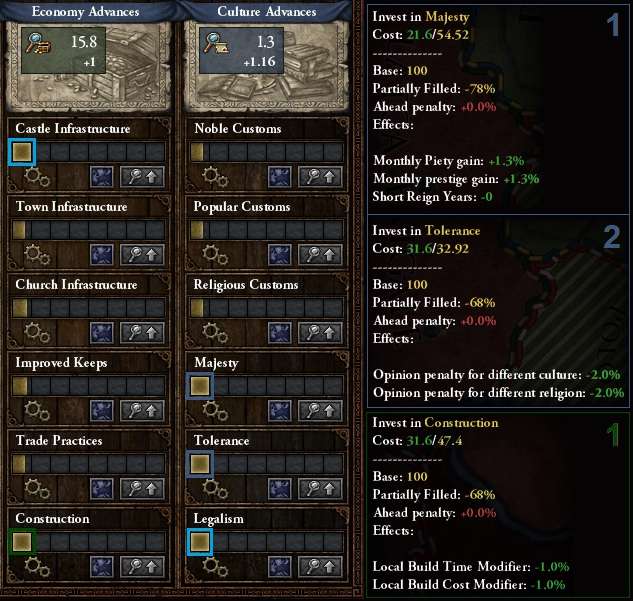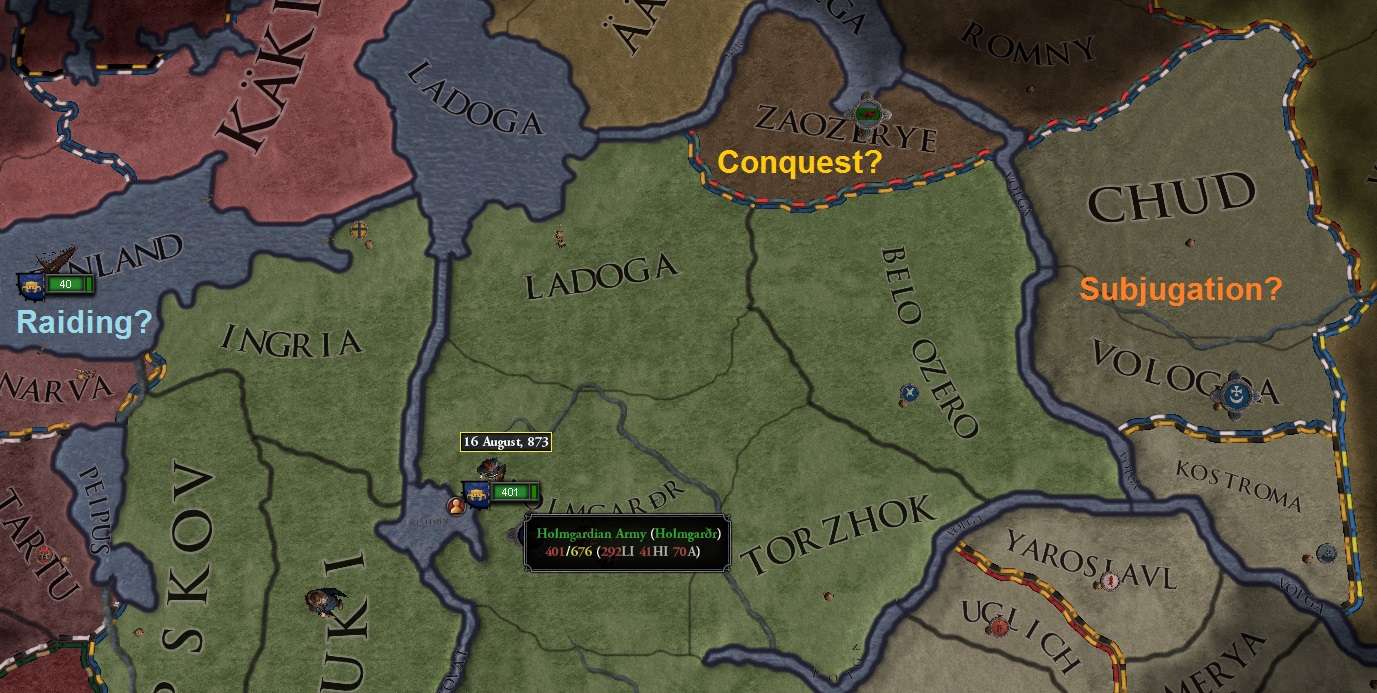Ch 15 Q1: Calling Allies when they are occupied. I was trying to avoid it, but the call for allies went out to Nuyanza as well, with Ingria currently occupied by the Pskovans. If he does respond, are his forces raised but slaughtered? Or raised inside his holding? Or are they just not raised? Just curious on what happens in-game. I take it they can be called one by one to avoid that? Any other key points or tips about calling vassal allies as a tribal leader welcome.
If they are under siege levies can still be raised, but it is indeed greatly dangerous, unless they far outnumber the siege forces. If its been occupied no troops can be raised from that holding.
Ch 15 Q2: Creating a New Duchy. Do I have this right? If Rurik creates it, there are no funnies about who it goes to – he can allocate it as he desires?
You get it, and can pass it out, but DON'T DO THAT until you are at least a king (at which point thats a pretty poor duchy in all fairness, so eventually it should be given out, but in the mean time is a nice way to qualify for a crown.
Ch 15 Q3: Housekeeping. I will need to set a guardian for the youngest child. At this stage, I don’t have the DLC that allows you to set a focus for the children, just choose a guardian. I’m thinking to pick as guardian the Norse courtier with the highest learning numbers/characteristics, but am open for other suggestions. With Eilif, under gavelkind is he likely to be made heir to anything else, or is it the smallest/weakest demesne county? Should I not bother developing it for now and just focus on the main four? And now that there is plenty of prestige to go around, should it be devoted to military buildings in the primary demesne counties? Any views on the best kind of buildings to start with in this situation?
If you are operating w/o conclave, I would suggest making Rurik himself the guardian/educator, as he has the level 4 martial education trait, and you can help influence your son, perhaps helping him get some of the positive traits you have (a brave educator means the child is more likely to get events for brave during education, etc.).
As for the prestige question, remember that if you spend it on buildings to go for level 2 of them, so save enough that you can upgrade whatever building(s) you make.
As for suggestions, I would suggest the training grounds building (upgrades to keep when you castle), as more levies are always welcome. Alternately you could put a weaponsmith in your capital (upgrades to training grounds ((castle version))), which will make what is currently your largest source of levies better.
Ch 15 Q4: How do you solve a problem like Helgi? Per the question posed by Rurik, what options and advice do the wise readership have (acknowledging there has been discussion about this before, but time has moved on and things are coming to a head. Rurik wants to sort out the way ahead before his time comes (as it could in combat at any time, but otherwise he probably has between 10 to maybe 15 years at the very most to see the succession stitched up as best he can. If Rus is the first major objective, should that take priority. And would a Slavic future be better for that? Or would Norse (reformed later if possible) be preferable? Any and all views sought.
I like the idea of letting him get scurvy and die.
Ch 15 Q5: Völva and Skald. Is the Völva the equivalent of the Court Physician in a Norse realm? I’ve not seen anything else that might look like that appointment. Does it work in a similar way, or does it bring entirely different benefits. And, also with the Skald, it this something I should be actively trying to source (ie looking for marriage partners for courtiers with the Mystic and Poet characteristics as a recruitment method, or some such)? Again, facts, views and hints most welcome.
Court physician requires The Reapers Due (and its accompanying disease changes). Volva and Skald are mostly useful to get opinion benefits from the recipients (skald has a large opinion bonus, while the volva requirements fit well with a female temple holder).
If they are under siege levies can still be raised, but it is indeed greatly dangerous, unless they far outnumber the siege forces. If its been occupied no troops can be raised from that holding.
Ch 15 Q2: Creating a New Duchy. Do I have this right? If Rurik creates it, there are no funnies about who it goes to – he can allocate it as he desires?
You get it, and can pass it out, but DON'T DO THAT until you are at least a king (at which point thats a pretty poor duchy in all fairness, so eventually it should be given out, but in the mean time is a nice way to qualify for a crown.
Ch 15 Q3: Housekeeping. I will need to set a guardian for the youngest child. At this stage, I don’t have the DLC that allows you to set a focus for the children, just choose a guardian. I’m thinking to pick as guardian the Norse courtier with the highest learning numbers/characteristics, but am open for other suggestions. With Eilif, under gavelkind is he likely to be made heir to anything else, or is it the smallest/weakest demesne county? Should I not bother developing it for now and just focus on the main four? And now that there is plenty of prestige to go around, should it be devoted to military buildings in the primary demesne counties? Any views on the best kind of buildings to start with in this situation?
If you are operating w/o conclave, I would suggest making Rurik himself the guardian/educator, as he has the level 4 martial education trait, and you can help influence your son, perhaps helping him get some of the positive traits you have (a brave educator means the child is more likely to get events for brave during education, etc.).
As for the prestige question, remember that if you spend it on buildings to go for level 2 of them, so save enough that you can upgrade whatever building(s) you make.
As for suggestions, I would suggest the training grounds building (upgrades to keep when you castle), as more levies are always welcome. Alternately you could put a weaponsmith in your capital (upgrades to training grounds ((castle version))), which will make what is currently your largest source of levies better.
Ch 15 Q4: How do you solve a problem like Helgi? Per the question posed by Rurik, what options and advice do the wise readership have (acknowledging there has been discussion about this before, but time has moved on and things are coming to a head. Rurik wants to sort out the way ahead before his time comes (as it could in combat at any time, but otherwise he probably has between 10 to maybe 15 years at the very most to see the succession stitched up as best he can. If Rus is the first major objective, should that take priority. And would a Slavic future be better for that? Or would Norse (reformed later if possible) be preferable? Any and all views sought.
I like the idea of letting him get scurvy and die.
Ch 15 Q5: Völva and Skald. Is the Völva the equivalent of the Court Physician in a Norse realm? I’ve not seen anything else that might look like that appointment. Does it work in a similar way, or does it bring entirely different benefits. And, also with the Skald, it this something I should be actively trying to source (ie looking for marriage partners for courtiers with the Mystic and Poet characteristics as a recruitment method, or some such)? Again, facts, views and hints most welcome.
Court physician requires The Reapers Due (and its accompanying disease changes). Volva and Skald are mostly useful to get opinion benefits from the recipients (skald has a large opinion bonus, while the volva requirements fit well with a female temple holder).


